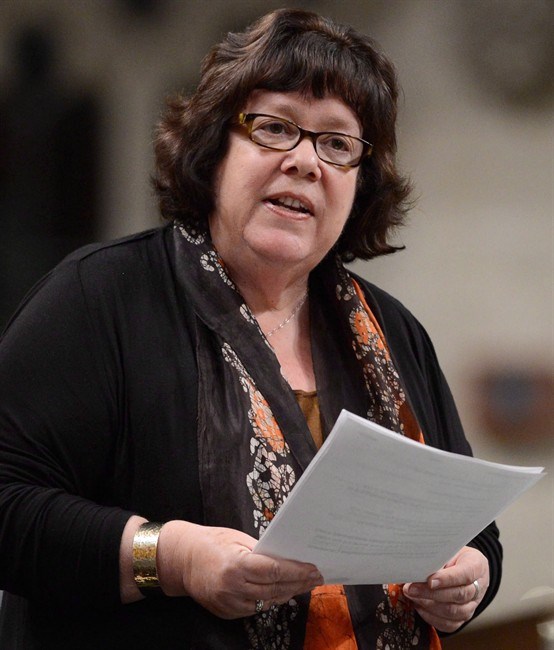Libby Davies, the Downtown Eastside activist who found herself catapulted into Ottawa as a federal Member of Parliament, is calling it quits after 40 years of public service.
The outspoken MP announced at her campaign office that she will not seek re-election in the upcoming federal election, saying she doesn't have the energy to run again and "it's time to pass the torch."
"I just feel like it's time to call it a day," she said. "There can be a new voice for East Vancouver."
The decision is bittersweet for Davies, 61, who said she loves her job and is grateful to the people in her riding of Vancouver East for helping her tackle tough issues in the Downtown Eastside such as housing, safe injection sites and the plight of missing women, despite being told she wouldn't get re-elected if she took on those issues.
"What I've become known for is taking on issues that are controversial and sometimes very tough but they've been really important for people in my community," said Davies, who is deputy minister to NDP leader Thomas Mulcair and has been a federal MP for 18 years. "I feel the people of East Vancouver stood by me when things got tough."
It hasn't been an easy road for Davies, who as a 19-year-old dropped out of university to pursue social justice in the Downtown Eastside — at the time called Skid Road — in 1972. Running a low-cost food stall, she and her friends started a newspaper in 1973 called the Downtown East when Davies was told by then-Vancouver Coun. Harry Rankin that 'you're going to run for city council.'"
"I never ever dreamed I would be an MP," she said. "It was really the activism in the Downtown Eastside where we were literally fighting City Hall over life and death issues ... people dying in fires and slum lords. We thought 'if we don't have representation at City Hall and our neighbourhood is being so ignore maybe we should run.'"
Davies, along with her late partner Bruce Eriksen and activist Jean Swanson threw their hats in the ring. She ran twice unsuccessfully before she was elected in 1980 to Vancouver Park Board. Two years later, she was elected to city council but left city politics in 1993 when she ran for mayor and was beat out by Philip Owen.
Those years at City Hall grounded Davies in what was important: helping people. "A lot of time, with politics, people think of it as Ottawa and power moves," Davies said. "It's about working on issues and helping people. City Hall taught me that."
When she was chosen for the federal NDP nomination, winning by 26 votes, and then elected in 1997, Davies didn't know what to expect. Having been responsible, as a city councillor, for all of Vancouver, she said it was a huge switch to have East Vancouver as her sole focus. "It seemed like such a luxury," she said.
But it wasn't long before Davies realized just how slow the wheels turned in Ottawa. Although she was dealing with same issues, she found it tough to get the ear of those making decisions at the federal level. She tried unsuccessfully to raise the issue of drug overdoses with Liberal Health Minister Allan Rock until she decided to revert to her activist roots.
"I sat in his offce and said 'I refuse to leave until I get an appointment,'" Davies said. "I told his secretary I had all the media outside even though I didn't. But I got a date and developed a good relationship."
Although it was decidedly slower in Ottawa, Davies said as an MP, she had a chance to play a crucial role in making changes that affected the DTES. She's proud of the fact that in 1998, she led a national tour on housing and homelessness to get it back on the national agenda even though her riding is still suffering today in terms of affordable housing.
"The DTES has changed a lot and there's been fierce battles in that neighbourhood from day one," she said. "I remember the first mega projects. The pressure on that neighbourhood has always been enormous because real estate is expensive and valuable. It's always been a battle to ensure that it's their home, that they have housing security."
Davies is known for her toughness. The first Canadian female politician at least at the federal level, she found herself in the spotlight in 2001 when she revealed her personal situation during a private member's bill debate on same-sex marriages.
"For me it was just like . . . what I was doing was trying to make the point I'd never been married but I uphold the right of anyone to be married," Davies said. "That's their choice."
She also landed in hot water after being caught on YouTube speaking out about the Middle East, and lamenting the fear politicians have about defending Palestinian rights. Davies said Mulcair "upholds the NDP policy on the Middle East as I do."
Davies said she's not sure what she plans to do after she leaves federal politics although will remain involved in the community. And while she will not endorse any candidates, she said she will encourage people in the community to run, saying she hopes Vancouver East will remain an NDP riding.
"It's been an enromous privilege to be a Member of Parliament," she said. "I've been proud to work with community activists out there doing their thing."



